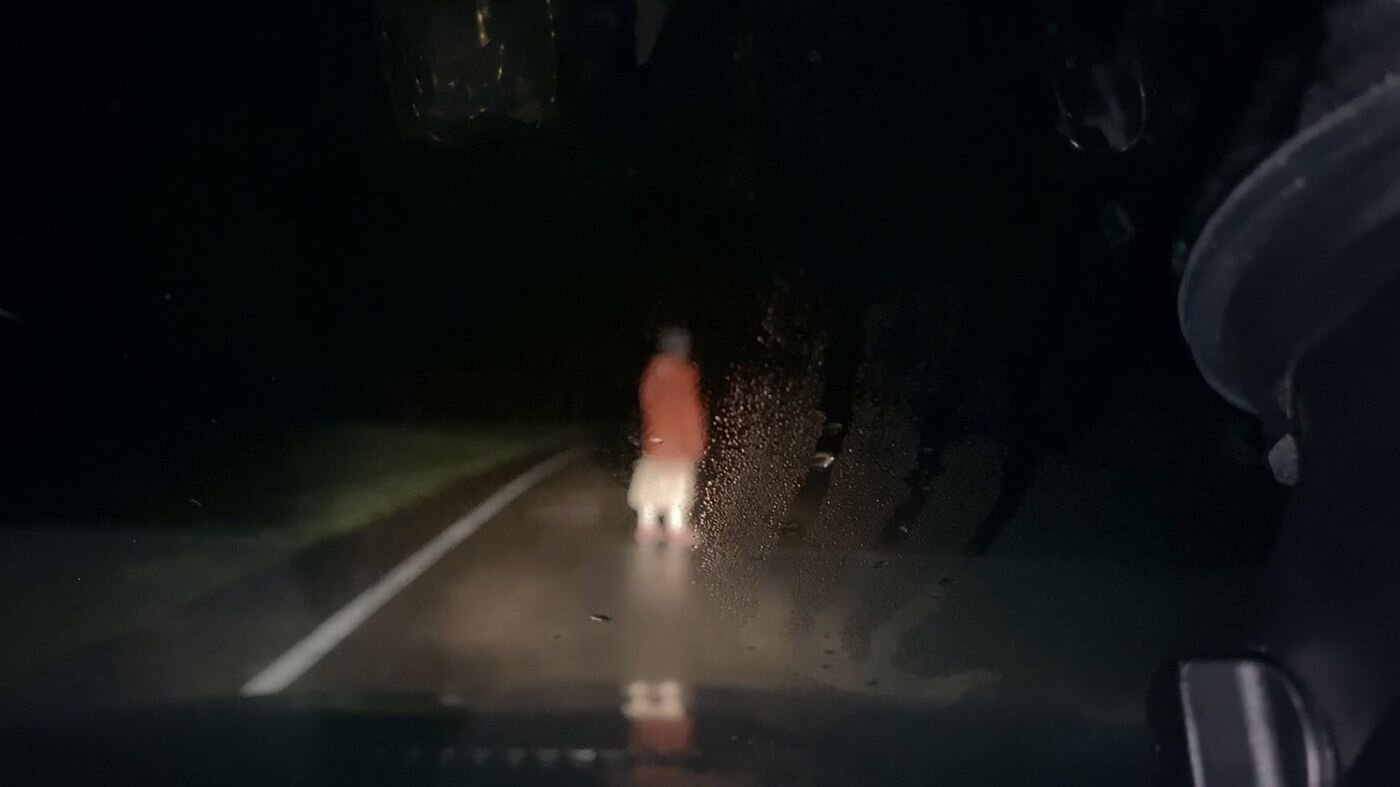'Dashcam' Review: A Found Footage Film Aiming To Troll It's Audience [TIFF 2021]
Rob Savage follows up his debut feature ‘Host’ with another pandemic horror film that seems to aim at audience’s patience, rather than their ability to be frightened.
The pandemic may have shut down many productions but some filmmakers saw that as an opportunity to get creative. One of those filmmakers is English writer/director Rob Savage. While most of Hollywood was on standstill, Savage made due with what he had and created the film ‘Host’, a supernatural horror film based completely around a zoom call between friends. Many could relate to trying to connect with friends and family members during the height of the Covid-19 pandemic which made the film much more frightening. It embraced the experience of being alone during a vulnerable time in everyone’s life with the paranoia being developed by that loneliness. Counteractive to that, his newest feature Dashcam had little of that creativity. What ‘Host’ had in new and creative ideas, Dashcam had a fair bit of cliches and obvious ripoffs. The most notable being that of ‘The Blair Witch Project’. To be fair, any movie using the technique of found footage will always be compared to Blair Witch due to it being the film that jumpstarted the genre, but the similarities between that and Dashcam are obvious. Mainly, the idea of navigating through a forest while seemingly being hunted by a supernatural entity. None of the ideas presented in this film have anything substantial to say and the only thing the movie does seem to get right is its stunning special effects, though that in itself is hard to even dig out due to the constant shakiness of the camera.
A very prominent part of the storyline is the added effect of the main character being a clear advocate against lockdowns, the validity of the government and COVID itself, and the obnoxious way she presents those ideas to others. Dashcam stars Annie Hardy, playing an exaggerated version of herself in the film, a musician who hosts an online freestyle live stream where she rattles off rhymes repeatedly using risqué humour akin to that of a 14-year-old boy. She dreads the pandemic in Los Angeles so she decides to take trip to London, England to visit her old bandmate ’Stretch’. Throughout the film, she lets her opinions be known, wether that be telling her bandmate he is now a ‘cuck’ for having a girlfriend who follows the COVID guidelines, or yelling at a shop owner and flipping over tables because she is told to put on a mask and she refuses to do so. There is no subtlety in her act as she even at one point wears a mask with the word slave written on it. In the first act of the film, it felt like it was being set up to actively root for her demise, but as the film went along it became painfully obvious that her role was that of comedic relief and was not going to give that up for a final kill. The issue was the comedy of this film felt like it was ripped right from a twitter thread about ‘fake news’. The idea of that wouldn’t be out of the question as Annie, who in reality, is an antivaxxer and conspiracy theorist, can be seen tweeting those exact sentiments on her Twitter account everyday. It’s either that or she’s so dedicated to method acting that she tweets microchip conspiracy theories from her social media. It doesn’t help either that the movie starts off with Rob Savage himself recording a message on his phone while walking to a convince store that spanned five minutes, explaining how there was no real script for this film and they just kept coming up with ideas as they went along.
Savage struck a three picture deal with Blumhouse Productions after the success of ‘Host’ and this was the first of the three to be presented the general audience. The production value is clearly there, even though it’s being shown through the vision of an iPhone and a woman running for her life. The extent of what the film does right really ends there though as the character design of the ‘monster’ is clearly taken from the pages of ‘Stranger Things’ while having the powers of the main character in the film ‘Chronicle’. All of this movie seems to be something that has been seen before. When the film tries to introduce something new, like the fact that the monster is actually a 16-year-old girl that looks like a 60-year-old woman, it spends absolutely no time in giving any possible explanation of how that came to be, instead focusing on the quips that Annie has to say about the situation. The lack of script really was clear as the same recycled situation of getting in a car, trying to drive away, and then crashing was repeated at least three times. Dashcam is incredibly hard to follow with the terrible cinematography hidden in the excuse of a subgenera while also having to deal with seeing hundreds of comments on the side of the screen from diehard fans of the main characters livestream spouting the same sentiments she echoes throughout the movie.
The film even being selected by the Toronto International Film Festival felt very out of character for a festival who prides itself on its progressiveness and inclusion (even for the more fringe films that can be found as part of ‘Midnight Madness’). Dashcam has already drawn criticism for its casting choice of a woman who promotes ideas that are controversial while repeatedly using terms that are seen as the opposite of progressive. If Rob Savage’s intention though was to garner buzz around the film for its controversy though, he may have achieved his goal. As they say, all press is good press.



